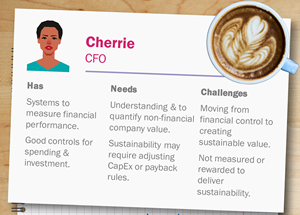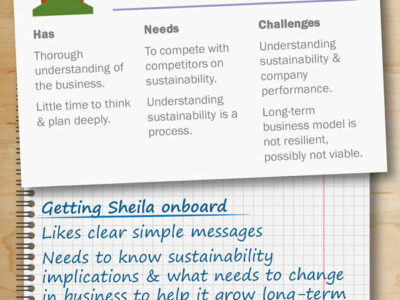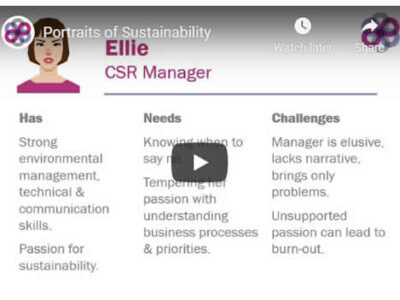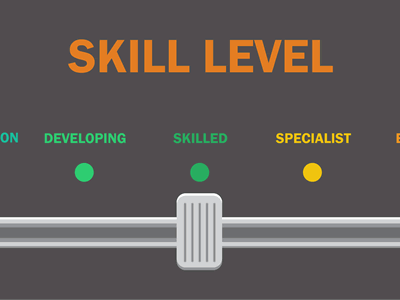Sustainability is vital, but also exciting. What are the key things to bear in mind when thinking of a career in sustainability?
The profession is slowly maturing, and different career routes are possible. But how do you find do you get started and then develop your path?

Turning a passion into a profession
Sustainability attracts passionate and committed people, but how do you build a professional career in sustainability?
I get contacted frequently by existing and new contacts asking for advice on entering the world of sustainability and sustainability consulting. I always do my best to help, though sometimes whilst also wondering whether I could have found a silver bullet to smooth my career, or deliver the security and progress which some professions naturally have.
Unfortunately, of course, no such silver bullet exists for me or for anyone else. Whilst sustainability has many of the characteristics of a professional career, as yet it lacks the structure and progression you find in most, more “mature professions”.
What EXACTLY do I want to do, the questions to ask yourself
So, as with the development of career ambition in any profession, the key things to bear in mind when thinking of a career in sustainability are as follows:
- What is your passion – what do you want to achieve/change?
- What people and organisations inspire you?
- What are the things that your experience and skills enable you to do that is unique and valuable?
- What new skills and experience do you need to develop in order to get where you need to go?
- Where do you want to play – which bit of sustainability can you add value to?
- How do you want to play – operationally or strategically – do you want to focus at the level of detail or big picture?
- What is the pain – why would a client need to look you up/jump when you contact them?
- What is your network – who do you know that you might be able to discuss opportunities with or deliver added value services with?
- Where do you want to live/work?
- Career in Sustainability? – profession and professionalisation
As noted above, sustainability is slowly professionalising. Whilst it is still possible to find people in senior sustainability or CSR jobs with PR and communications backgrounds, you can equally find people coming from the earth or natural sciences, environmental science and technology, business management and many other disciplines.
In addition, the recognition and development of specific sustainability skills are an increasing part of the set of capabilities required in sustainability consultants and managers. The Institute of Environmental Management and Assessment (IEMA) has developed a skills map, highlighting the range of skills required at different professional levels and for varying roles in sustainability.
This approach is gaining huge traction, from companies using the map to identify the competencies they will require for strategic HR development (if you are a company with a strategic sustainability agenda – you are a company with sustainability skills needs), to professions assessing the extent to which their Continuing Professional Development (CPD) needs to adopt and adapt specific sustainable skills.
Sustainability skills – a new discipline or an added extra?
A number of initiatives have concentrated upon recognizing and developing specialised skills in sustainability. Personally, I have been involved a number over the years, focused both on the cross-professional competencies required for us all to play a part in a sustainable world, and also the specific, tailored skills required in different professions, these include:
- Professional Practice for Sustainable Development (PP4SD): this joint initiative pioneered the concept and provides useful guidance on professional practice for sustainable development (PDF).
- the house building industry also conducted research into the skills required to deliver zero carbon and sustainable housing.
Update – is sustainability growing up?
The professionalisation of sustainability has also taken some significant strides in recent years. The UK based, but global ICRS (Institute of Corporate Responsibility & Sustainability) was officially launched in July 2014 with a the goal of “supporting CR and sustainability professionals to be brilliant at all stages of their careers. We recognise, promote and support high standards of professional practice.” The ICRS (and here I have to state an interest, both Terrafiniti’s founding partners are Inaugural Fellows) is focused upon providing professional development, clear skills progression and reinforcing the notion that to be a practitioner in sustainability and CR there should be some means of demonstrating professional context and a clear, earned, skill set. The ICRS Competency Framework can be viewed here.
In addition, also in 2014, IEMA developed a partnership with GACSO (the Global Association of Chief Sustainability Officers) to evolve the Institute’s approach beyond the traditional environmental management focus upon which it was founded.
Other developing professional associations also exist across the world (and this blog is unlikely to present an exhaustive list), for instance the ISSP (International Society of Sustainability Professionals) represents more than 700 practitioners from across the world and brings opportunities for professional development, knowledge sharing and communities of practice.
What part in sustainability do you want to play?
As a invaluable counterpart to those of us who have a dedicated career in sustainability, there is also a need for people from all backgrounds and professional disciplines to ask; “what role can my expertise, experience and understanding play in a sustainable world?”
As opposed to the development of specific sustainability skills, there is also a role in sustainability for specialists in other areas to turn their minds to sustainability challenges.
Meeting the challenges of the future requires solutions built upon deep and robust expertise in many areas – finance, investment and economics, engineering, physics, human behavior, business management, organisational and personal development.
The challenges of the future require coordinated, multidisciplinary expertise and passion in order to solve them.
I believe that, in time, all of us will have a career in delivering sustainability, each with our own particular areas of specific expertise and skills.
This article was republished by TSSS (Toronto Sustainability Speaker Series) on 09/02/15. Minor updates and link updates 27/01/2020.
DISCOVER MORE | Sustainable Business Skills
Communicating Sustainability– how audiences value different language
To drive change in their organisations, sustainability professionals have to be effective influencers as well as content experts.
However, navigating how to develop the right messages for the right audiences can present a range of challenges, especially when sustainability can be complex, nuanced, …
Engaging leadership in sustainability – CFO
Engaging leadership in sustainability is vital – even in a large organisation with dedicated sustainability specialists. To ensure that sustainability becomes and remains a strategic priority, sustainability professionals need to work hard to get the organisation on board. You need to start with the …
Sustainability people that matter – engaging the CEO
To make sustainability a strategic priority, sustainability professionals need to work hard to get the organisation on board. They need to start with the positions, roles, places and people that matter. Here is Sheila, the CEO.
Sustainability Specialists
Why is it sustainability specialists can find their jobs both frustrating and lonely? It’s usually a wider business problem.
There are many reasons for this, some more visible than others. Based on real conversations, I look one of the main issues that often
underlies the frustration.
Portraits of sustainability – where are sustainability skills gaps?
Every organisation has sustainability skills gaps, but do you understand where they are and the problems they are causing?
Ensuring your organisation identifies and addresses skills gaps is crucial – it’s as important as getting your strategy right.
Sustainability skills for everyone… not just the professionals
If your company has a sustainability ambition it also has a need for sustainability skills – but who needs them and how do you take a planned approach?
Sustainability Managers: key challenges to best practice
While sustainability management has in many ways entered the mainstream, practitioners are often hampered by resistance, apathy and misunderstanding.
There are many examples of excellence in specific areas, but few companies are pursuing a transformative agenda at significant scale.
As the …








Great article. Thank you.
Especially for those such as myself, preparing the first step onto the ladder.
Thanks, lots of useful tips and comments here especially regarding the need for those in diverse fields to contribute their skills to work toward more sustainable commercial and domestic practices.
Very useful points to focus on, especially in whether an operational, srategic, detailed or ‘helicopter’ role is suitable. To quote Mike Barry (M&S) – “Carry on doing what you are good at, but do it in with more of a focus on sustainabilty”. With this in mind it strikes me that promoting and delivering tailored training and consultancy in decision-making for sustainability and best practice for those a little smaller than the FTSE 500 at Senior and ‘Middle Manager’ level is required, and is what I would really like to do!
Dear Richard,
Glad the post is of value and wishing you the best in your endeavours!
Joss
Hi! thanks for this post. Any update on the work outlook for sustainability graduates these days?
Dear Maribelle,
Thank you for your question. I am afraid I am only able to make a pretty general answer as I can’t find any overviews/ surveys of the sustainability job market (though you may be interested in the last biannual salary survey, which is here: http://crsalarysurvey.com/home).
It seems that in general the demand for and interest in sustainability is increasing and therefore logic would suggest that there would also be an associated need for recruitment of people with the right sort of skills.
However, of course logic in principle and what happens in practice don’t always match up!
One of the challenges which we have seen faced by graduates is that, due to the increase in graduate numbers, employers have in some cases taken the approach of using internships (often unpaid) as a way of meeting their needs at the expense of the graduates themselves.
From what I have seen, to some extent this trend may have peaked as the unfairness of the approach has been highlighted, as has its illegality (for private sector, unpaid internships).
In practice all I can do is wish you all the very best with your career and advise you to keep a focus on your mission in life, get involved with Institutions such as the Institute for Corporate Responsibility and Sustainability: https://icrs.info/ , and the Green Drinks Network: http://www.greendrinks.org/
I hope this is useful, and sorry not be of more concrete value!
Best regards,
Joss